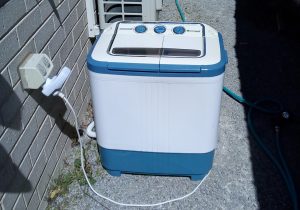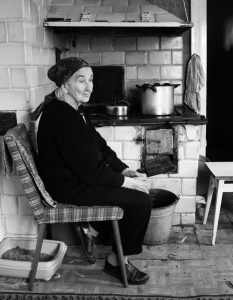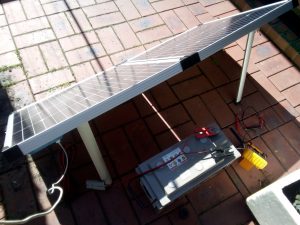Menu image: Photo Credit, Steve Polenski
Reading about back up power may make you wonder if you need a power connection at all. We don’t believe that a gas connection is essential (see Going gas free) but here’s what we think is necessary to cut the power as well:
- You need a house that rarely goes below 15 degrees in winter, has a wood heater or you are really not bothered by the cold. Typically, a house in Melbourne gets down to 8-10 degrees without any heating during the coldest winter days.
- You need a house that rarely gets above 30 degrees indoors in summer so that you can use low powered options like fans or personal evaporative coolers to keep cool at temperatures above 25 degrees.
- You need a non grid indoor cooking/water heating option (properly installed wood stove or approved bottled LPG appliance, never use a portable wood or LPG stove indoors) or live in an area where outdoor cooking is viable all year round.
- Ideally, you would be comfortable washing clothes by hand/using a soft start washing machine and could use a portable spin dryer for spin drying your clothes in winter when they are hard to dry.

- You’ll need to use a washing line or clothes rack to dry your clothes (which is something everyone should know how to do anyway).
- Ideally, you can store your food without refrigeration at least in the winter months when there is not much sun for solar production. If you use a fridge in the warmer months, a 12 volt fridge is ideal as it avoids the need for a large inverter (1500 watts or more for start up).
- You’ll want to avoid a place with carpet as carpet is hard to clean without a vacuum cleaner whereas a hard floor can be swept and rugs can be shaken out.
- You’ll want to avoid any house that has electric gates, garage doors, etc. that you depend on as it will be difficult and costly to wire these up as a renter to run without permanent wiring.
- You’ll want to avoid power tools that go above 300 watts unless you already have a generator and don’t use power tools much or you are buying a 1000+watt inverter to run a fridge/washing machine.
- If your house has hardwired smoke detectors, you’ll need to either install the batteries in them so they keep working or you’ll need to use one or two portable ones.

“Easter1” by MartinJ-N is licensed under CC BY-NC 2.0
- Best to use low powered devices that can run on 12 volt DC, thus avoiding the need for an inverter and larger battery system to cope (e.g. laptops, phones, lighting).
- For occasional use, many of these devices excluding refrigeration can run off a cheap 300 watt inverter. For such low power use, a single 1kWh lead acid battery would be enough to safely supply this amount of power.
- If you are setting up a decent sized off grid solar system, you should find a house that has a decent gap somewhere that will enable you to run wiring into the home. You’ll also need to be absolutely sure of what you are doing to avoid shock or fire hazards.
- If your house allows, you could even have a few mini solar systems to service each room rather than one central system which could save on wiring.
- Best to use portable lighting in the bedrooms, bathroom, toilet and hallways so that you can centralise your system in the kitchen and living area where it’s most likely needed and occasionally run a power lead to the laundry or garage to use a washing machine or tools.
- We think that power use would need to be limited to 300Wh a day in winter and up to 1000Wh a day on a hot summer’s day.
- Depending on where you live, this would involve using 3x300watt solar panels, a suitable MPPT charge controller, a 300-1500 watt inverter and 1-2kWh of lithium battery storage or 4kWh of lead acid battery storage. You wouldn’t want a system any bigger than this if it needs to be moved from time to time.

Final thoughts
We could get four 1.2kWh batteries for free and an 8000watt inverter from a friend that couldn’t use it (a cheaper inverter that would be ok for occasional use) and one of us already had a 12 volt car fridge.
We could have put a system together for $1400 (3x300watt panels, an MPPT charge controller, cables and hardware) but we decided not to and when we moved, it turned out this system wouldn’t have worked in our new home.
We can maintain a functional household during a prolonged power outage and are happy to have a few luxuries when the power is working that could be incorporated into a permanent off grid system for a house if we decide to buy one day.
An off grid rental would suit a person, couple or family who is willing to be very minimalistic as it is cheaper to set up a system that can meet basic needs and such a system can pretty much work anywhere. Also, such a system would not cause a headache to set up.
This illustrates that completely being off grid means that you need to be very comfortable with adapting your lifestyle to the weather and seasons. And not just for one or two years but possibly for many years or decades. This is what separates off grid homes from on grid ones [1].
Further Reading:
[1] https://www.lowtechmagazine.com/2018/12/keeping-some-of-the-lights-on-redefining-energy-security.html#more